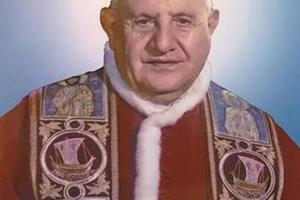John Paul the Great: How Pope John Paul II Lived and Helped Others Live the New Evangelization
Special Section: John Paul II John XXIII: Papal Saints for the New Evangelization

In 1978, I arrived in Rome as a new seminarian, after six years as a Wall Street stockbroker. Talk about a life changer!
Ten weeks after my arrival, I found myself in St. Peter’s Basilica, along with thousands of other people attending the installation of the now-St. John Paul (dare I add "the Great"?) as our new Roman pontiff.
At that moment, my life and that of the world changed forever. Though we did not yet know it, the New Evangelization had begun, ushered in by a pope from a faraway country. Its high point under his stewardship was probably the celebration in 2000 of the closing of the second millennium of Christianity and the opening of the third — an event that, in his fearless way, he described as Crossing the Threshold of Hope.
John Paul (a man in full!) lived out his entire life as a priest, bishop, cardinal and pope through a "sincere gift of self," made not once, but renewed day by day, moment by moment. He laid down his life for others right up to his last breath.
Who can doubt, then, that, from the realms of glory, he is now helping all who need help (and who does not?) when we ask his intercession in prayer.
To understand him better, you might consider reading or re-reading George Weigel’s magisterial biography or one of the many books of reminiscences by those who were closest to him in his long life.
Perhaps John Paul’s greatest work was to correctly define the meaning of the Second Vatican Council after several decades of contentious confusion. Being granted one of the longest pontificates in history gave the Holy Father the opportunity, through his writing and teaching, to make clear the Council’s emphasis on the universal call to holiness of all the faithful and their obligation to share their faith not only by example, but by word — in the workplace, among family and friends and in society.
That is to say, the Church’s main mission is not to build institutions (however good they may be) or to incorporate every layperson into semi-clerical status in the parish, but to produce saints — yes, even married saints — and to evangelize, bringing the attractive truth of the Gospel to those caught up in a world of inferior and impermanent attractions and sharing with them the beauty of the Bride of Christ, the Church.
John Paul II clearly was chosen by the Holy Spirit through the cardinal-electors in the conclave as the right man for the times. The accomplishments that place him among the most outstanding popes in the very long history of the Church are too many to squeeze into this small space, but I will single out my favorites. You can choose your own — there are plenty to go around! In no particular order, then:
- He played a primary role in the destruction of the evil empire of atheistic communism (along with some help from Ronald Reagan and Margaret Thatcher).
- He was perhaps the greatest evangelizer of the faith since St. Paul evangelized the Mediterranean region 2,000 years earlier.
- He made some 300 trips to innumerable countries, sharing the Good News with hundreds of millions of all races and colors and making him the man seen in the flesh by more people in all of history.
- He canonized many more saints than any previous pope.
- He regularized relations with Israel and opened dialogue with the Orthodox Christians that had been closed for many centuries, sparking the hope that in the not-too-distant future we may once again be united in one family of faith.
- He had the wisdom to name as cardinals Pope Emeritus Benedict XVI and Pope Francis, both worthy successors for the Seat of Peter.
As if all of this were not enough, he left us a legacy of papal magisterium that we will be mining for centuries. He was arguably the greatest philosopher-pope in history, as demonstrated by the 14 encyclicals he wrote, by my count, not to mention the 36 apostolic letters and 15 apostolic exhortations.
Difficult though it is to single out a few for special mention, I would recommend that my readers go back to (or visit for the first time) John Paul’s encyclicals about Human Work (Laborem Exercens), mercy (Dives in Misericordia), The Gospel of Life (Evangelium Vitae), That All May Be One (Ut Unum Sint), Faith and Reason (Fides et Ratio), Mission of the Redeemer (Redemptoris Missio) and (the last one he wrote) the Eucharist (Ecclesia de Eucharistia).
From sampling the riches of his thought and contemplating the generosity with which he gave his life to God daily, I hope you will be led to do likewise in your own sphere: to turn the world upside down with the zeal of the first Christians by sharing your faith through prayer, words and deeds.
John Paul the Great, pray for us, that we may grow in holiness and the desire to win the world for Christ!
Opus Dei Father C. John
McCloskey III is a research fellow of the
Faith & Reason Institute in Washington.
ANSA image
- Keywords:
- April 20-May 3, 2014














